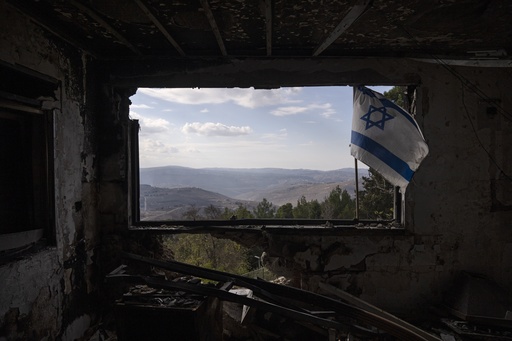KIBBUTZ MALKIYA, Israel — Dean Sweetland surveys a desolate street in Kibbutz Malkiya, an Israeli settlement that lies on a hill overlooking the Lebanese border. The community, largely abandoned for a year, currently presents a grim picture. With closed daycare facilities and neglected homes, the landscape bears scars from fires ignited by stray rockets from Hezbollah. Despite the implementation of a fragile ceasefire aimed at fostering the return of citizens to northern Israel, the atmosphere remains bleak and uninviting.
“The ceasefire feels meaningless,” expressed Sweetland, a gardener who is part of the kibbutz’s security team. “Do you honestly believe I will encourage my friends to come back?” The area has been mostly deserted since October 8, 2023, after escalating violence from Hezbollah, which began launching attacks across the border in solidarity with Hamas in Gaza. This conflict resulted in extensive cross-border exchanges, impacting both Lebanese villages and Israeli communities along the frontier.
Even as Lebanese citizens have hastily returned to their homes in the south following the truce, many in northern Israel remain deeply distrustful. Sweetland articulated these concerns: “Hezbollah could easily reestablish its presence at the border. Who will safeguard us then?” Israel’s leaders aspire to revitalize these border areas critical for national security; however, fear of Hezbollah, skepticism towards the United Nations peacekeeping forces, and rising discontent with the Israeli government are all influencing the reluctance of residents to return right away.
Before the ceasefire, around 45,000 Israelis had fled from northern locales. Armed conflict had made return profoundly daunting for many. The truce mandates that Hezbollah withdraw its military presence from southern Lebanon, where it had been amassing arms and constructing military infrastructure. While a U.N. peacekeeping unit called UNIFIL is supposed to monitor this situation, doubts persist regarding its effectiveness.
Sarah Gould, who evacuated Kibbutz Malkiya with her children at the onset of the conflict, expressed frustration about the government’s narrative regarding Hezbollah. “Hezbollah fired upon us up until the moment the ceasefire was declared,” Gould remarked, denouncing the assurances of safety being conveyed by officials.
The Israeli government’s offensive against Hamas in Gaza is proceeding vigorously, with Palestinian casualties recently exceeding 44,000. However, Israel’s strategic objectives in Lebanon relate primarily to pushing back against Hezbollah, rather than seeking its total dismantlement. Opposition voices within Israel argue for a more aggressive approach to neutralize Hezbollah’s threat along the border.
“I won’t even think about going back home until I know there is a buffer zone established,” remarked Gould. While some wary families returned to areas further from the frontline, locations like Kibbutz Manara remained virtually abandoned and desolate.
Orna Weinberg, a 58-year-old lifelong resident of Manara, indicated that the situation is too unpredictable to return now. The kibbutz has been particularly exposed during the conflict, with significant damage reported to its infrastructure. Inside the communal areas, destruction is evident, with fallen ceiling beams and ashen debris littering the floor. The remnants of rocket debris lay scattered throughout, symbols of the violence that invaded their lives.
“UNIFIL hasn’t prevented the buildup of Hezbollah before; why should they be able to do so now?” Weinberg questioned. She fears that the ceasefire merely offers Hezbollah time to regroup and restore its operations closer to the border.
In the midst of uncertainty, sporadic gunfire has been reported, with Israeli troops acting to deter Lebanese civilians from entering certain risky areas. Although the ceasefire has brought pauses in hostility, many inhabitants still feel deeply insecure.
While Kibbutz Malkiya displayed tentative signs of tranquility with the cessation of rocket fire, residents are hesitant to return. Many had set up new lives elsewhere during their year of displacement, making the prospect of returning to a community that now feels foreign exceptionally daunting. In contrast, the situation in Lebanon remains dire, with many displaced individuals forced into makeshift shelters or to sleep outdoors as the conflict rages on.
According to Gould, the return to Malkiya may only happen when government support for evacuees dwindles, pushing people to go back not out of choice, but necessity. “This goes beyond safety concerns,” she explained. “After a year of rebuilding, moving back to a place that’s just a label for home is a daunting task. It no longer feels the same.”
Uncertainty looms over local schools and whether they will have sufficient students. Many children have already enrolled elsewhere, while Gould herself enjoys the reprieve of living farther away from the risks of warfare.
Sweetland, one of a small group of civilian security volunteers who remained in Malkiya during the chaos, helped maintain the community under constant threat. He reflected on the absence of external support during the conflict, stating, “We were completely on our own for months, begging for help.”
As he keeps vigil over the quiet paths of his kibbutz, Sweetland remains hopeful that the day will come when families will feel secure enough to return. However, he anticipates it may be an extended wait. Meanwhile, Weinberg longs to return home, even as she witnesses a neighbor prepare to leave after assessing the damage to her residence. They share a brief moment of connection, but the woman departs visibly distressed, highlighting the emotional toll of the prolonged conflict.
